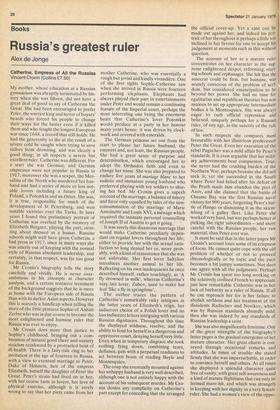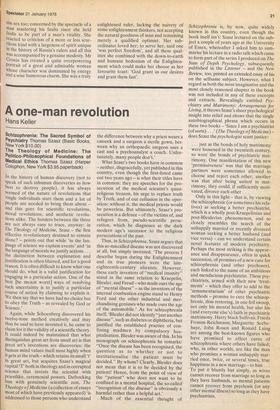Books
Russia's greatest ruler
Alex de Jonge
Catherine, Empress of All the Russlas Vincent Cronin (Collins £7.50)
My mother, whose education at a Russian gymnasium was abruptly terminated by history when she was fifteen, did not have a great deal of good to say of Catherine the Great. She had been encouraged to prefer Peter, the warrior king and terror of boyars' beards who forced his people to change their ways for the better even if it killed them and who fought the longest European war since 1648, a record that still holds. He had the generosity to die as the result of a severe cold he caught when trying to save sailors from drowning, and was clearly a good thing; in all respects a severe but excellent ruler. Catherine was different. For a start she was German, and German empresses were not popular in Russia in 1917; moreover she was a sexpot, the Messalina of the North who murdered her husband and had a series of more or less notable lovers including a future king of Poland, a Potemkin and an Orlov. She was, it is true, responsible for much of the development of St Petersburg, and won notable victories over the Turks. In later years I found this preliminary portrait of Catherine was overlaid by the memory of Elizabeth Bergner, playing the part, strutting about dressed as a hussar. Russian schools might well have given Catherine a bad press in 1917, since in many ways she was utterly out of keeping with the normal style of Russian absolutist leadership, and certainly, in that respect, was far too good for Russia.
Mr Cronin's biography tells the story carefully and vividly. He is never overambitious in his attempts at character analysis, and a certain tentative treatment of the background suggests that he is more at home with the European side of Russia than with its darker Asian aspects. However this is scarcely a handicap when telling the story of the little princess Sophie of Anhalt Zerbst who was in due course to become the most enlightened and humane ruler that Russia was ever to enjoy.
Mr Cronin does more than justice to Sophie's childhood, bringing out a combination of natural good cheer and nursery stoicism reinforced by a protracted bout of ill-health. There is a fairy-tale ring to her invitation at the age of fourteen to Russia, with a view to eventual marriage to Peter, Duke of Holstein, heir of the empress Elizabeth, herself the daughter of Peter the Great. Peter's strain had lived on in her, with her coarse taste in lovers, her love of physical exercise, although it is surely wrong to say that her piety came from her mother Catherine, who was essentially a rough but jovial and kindly vivandiere. One of the first sights Sophie-Catherine saw when she arrived in Russia were fourteen performing elephants. Elephants had always played their part in entertainments under Peter and would remain a continuing feature of the Imperial court, perhaps the most interesting one being the enormous beast that Catherine's lover Potemkin would produce at a party in her honour many years hence: it was driven by clockwork and covered with emeralds.
The German princess set out from the start to please her future husband, the empress and, not least, the Russian people. She had a great sense of purpose and determination, which encouraged her to adopt the Orthodox faith and even to change her name. She was also prepared to endure five years of manage blanc to her sadistic and immature young husband who preferred playing with toy soldiers to sharing her bed. Mr Cronin gives a superb account of the marriage, a balance of misery and farce only equalled by tales of the nonconsummation of the marriage of Marie Antoinette and Louis XVI, a ménage which required the intimate personal counselling of Joseph!! of Austria to get it going.
It was surely this disastrous marriage that would make Catherine peculiarly dependant on regular lovers throughout her life; either to provide her with the sexual satisfaction so long denied her or, more probably, with a kind of reassurance that she was not unlovable. Her first lover Saltykov introduces another animal to her life. Reflecting on his own inadequacies he once described himself, rather touchingly, as 'A fly drowned in milk', whereas Catherine's very last lover, Zubov, used to make her feel 'like a fly in springtime'.
The author traces the pattern of Catherine's remarkably risky intrigues in the latter years of Elizabeth's reign, her indiscreet choice of a Polish lover and no less indiscreet letters intriguing with various Russian dignitaries. Throughout this time she displayed wildness, resolve, and the ability to fend for herself in a dangerous and oppressive court, denying herself very little. Even when in temporary disgrace she took nothing lying down, combining tears, defiance, guts with a perpetual readiness to act between bouts of reading Bayle and Montesquieu.
The coup she eventually mounted against her unhappy husband is very well described, although one is not entirely happy with the account of his subsequent murder. Mr Cronin denies any complicity on Catherine's part except for conceding that she arranged the official cover-up. Yet a case can be made out against her, and indeed his portrait of her throughout is perhaps a little too inclined in her favour for one to accept his judgement at moments such as this without question. The account of her as a mature ruler concentrates on her character as the supreme enlightened despot, reforming, starting schools and orphanages. She felt that the autocrat could be firm, but humane, was acutely conscious of the problem of serfdom, but considered emancipation to be beyond her power. She had no time for egalitarian and republican theories but was anxious to set up appropriate intermediate bodies a la Montesquieu. She was always eager to curb official repression and believed, uniquely perhaps for a Russian ruler, of any age, in the sanctity of the rule of law.
In such respects she compares most favourably with her illustrious predecessor Peter the Great. Even her execution of the rebel Pugachev was a mild affair by Peter's standards. It is even arguable that her military achievements bear comparison. True, she never had the crushing burden of the Northern War, perhaps because she did not seek it; yet she succeeded in the South where Peter had failed after his defeat on the Pruth made him abandon the port of Azov, and she claimed that the battle of Chesme Bay was the first Russian naval victory for 900 years, forgetting Peter's battle of Hango or dismissing it as the skirmishing of a galley fleet. Like Peter she worked very hard, but was perhaps better at picking the right subordinates — and more careful with the Russian people, her raw material, than Peter ever was.
It must be said that in the latter pages Mr Cronin's account loses some of its crispness of focus. He cannot quite cope with the old problem of whether or not to proceed chronologically or by topic and the pace becomes a bit jumpy sometimes. Nor does one agree with all the judgments. Perhaps Mr Cronin has spent too long working on the relatively civilised French to appreciate just how remarkable Catherine was in her lack of barbarity as a ruler of Russia. If all he can reproach her for is her failure to abolish serfdom and her treatment of the dissidents Radischev and Novikov, which was by Russian standards absurdly mild, then she was indeed by any standards of Russian leadership a saint.
She was also magnificently feminine. One of the great strengths of the biography's latter pages is the gradual emergence of her mature character. Her great charm is conveyed through occasional remarks and attitudes. In times of trouble she stated firmly that she was imperturbable, in order to convince herself and others. At all times she displayed a splendid character quite free of vanity, with great self-awareness and a kind of mature flightiness that can only be termed mare-ish, and which was strangely in keeping with her dignity as a very female ruler. She had a woman's view of the oppo site sex too; concerned by the spectacle of a man mastering his faults since she held faults to be part of a man's vitality. She reacted to criticism of a more or less scurrilous kind with a largeness of spirit unique in the history of Russia's rulers and all this Was accompanied by a genuine modesty. Mr Cronin has created a quite overpowering Portrait of a great and admirable woman Whose character was dominated by energy and a wise humorous charm. She was a truly enlightened ruler, lacking the naivety of some enlightenment thinkers, not accepting the natural goodness of man and remaining merely a qualified optimist. Her subordinates loved her; to serve her, said one 'was perfect freedom', and all these qualities she combined with the down-to-earth and humane hedonism of the Enlightenment which could make her choose as her favourite toast: 'God grant us our desires and grant them fast'.



































 Previous page
Previous page